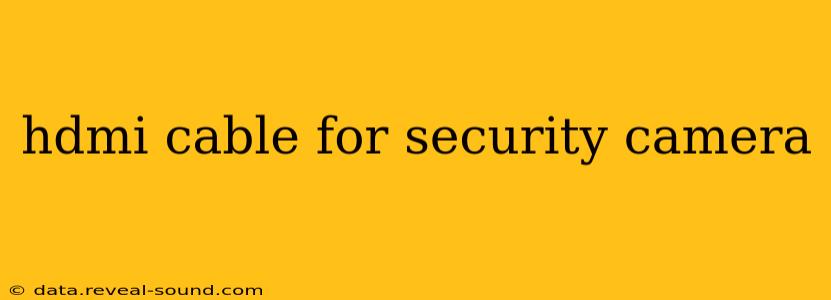Security cameras are increasingly relying on high-definition video, and transmitting that crisp footage requires a reliable HDMI cable. But not all HDMI cables are created equal. Choosing the right one depends on several factors, and understanding these nuances can save you headaches and ensure optimal performance for your security system. This guide will help you navigate the world of HDMI cables for security cameras.
What is an HDMI Cable?
High-Definition Multimedia Interface (HDMI) cables transmit high-definition audio and video signals digitally. They're the standard for connecting many devices, including security cameras, DVRs (Digital Video Recorders), NVRs (Network Video Recorders), and monitors. The advantage of using HDMI over other connections like composite or component video is the superior picture quality and ease of use, especially for high-resolution cameras.
What Kind of HDMI Cable Do I Need for My Security Camera?
This depends heavily on your system's requirements. Here's a breakdown of factors to consider:
1. Resolution:
- Standard Definition (SD): Older systems might use SD, requiring less bandwidth. A standard HDMI cable will suffice.
- High Definition (HD): 720p and 1080p HD cameras require a cable capable of handling the increased bandwidth. A standard HDMI cable will likely work, but a higher-speed cable (discussed below) is recommended for reliability.
- Ultra High Definition (UHD) or 4K: 4K security cameras necessitate a high-speed HDMI cable, potentially even a premium ultra-high-speed cable to handle the significantly higher bandwidth demands. Compromising here can lead to signal loss, resulting in poor image quality or dropped frames.
2. Cable Length:
Longer cables inherently have higher signal loss. The longer the cable, the more likely signal degradation becomes, especially at higher resolutions. For extended distances, consider using:
- HDMI Extenders: These devices boost the signal, allowing you to use longer cables without significant quality loss.
- Active HDMI Cables: These cables have built-in amplifiers to improve signal strength over longer distances.
3. HDMI Cable Standards and Speed:
- Standard Speed HDMI Cables: Suitable for older systems and lower resolutions.
- High-Speed HDMI Cables: Designed for 1080p and some 4K resolutions.
- Ultra High-Speed HDMI Cables: Essential for 4K at higher refresh rates and higher bandwidth applications. These cables support features like HDR (High Dynamic Range).
Choosing the right HDMI standard ensures compatibility and prevents issues with signal degradation.
What are the Differences Between Standard, High-Speed, and Ultra High-Speed HDMI Cables?
The key difference lies in the bandwidth they can handle. Standard speed cables handle lower resolutions, while High-Speed and Ultra High-Speed cables are designed for higher resolutions and data rates, allowing for features like 4K and HDR. Choosing the wrong speed can lead to signal loss or incompatibility.
How Long Should My HDMI Cable Be?
The ideal length depends on your setup. Shorter cables are generally preferred to minimize signal loss. However, practical considerations may necessitate longer cables. For very long distances, it's crucial to consider using an HDMI extender or an active HDMI cable.
Can I Use a Standard HDMI Cable for a 4K Security Camera?
While it might work, it's not recommended. Using a standard cable with a 4K camera can lead to poor image quality, signal dropouts, and even complete failure to display the video. An Ultra High-Speed HDMI cable is recommended for optimal performance.
What Happens If I Use the Wrong HDMI Cable?
Using an inadequate cable can result in:
- Poor Image Quality: Pixelation, blurring, or other visual artifacts.
- Signal Loss: Intermittent video drops or complete signal failure.
- Incompatibility: The camera may not work at all.
By understanding these factors and carefully selecting the appropriate HDMI cable, you can ensure a reliable and high-quality video feed for your security camera system. Remember to always check your camera's specifications to determine the required bandwidth and resolution before purchasing a cable.
